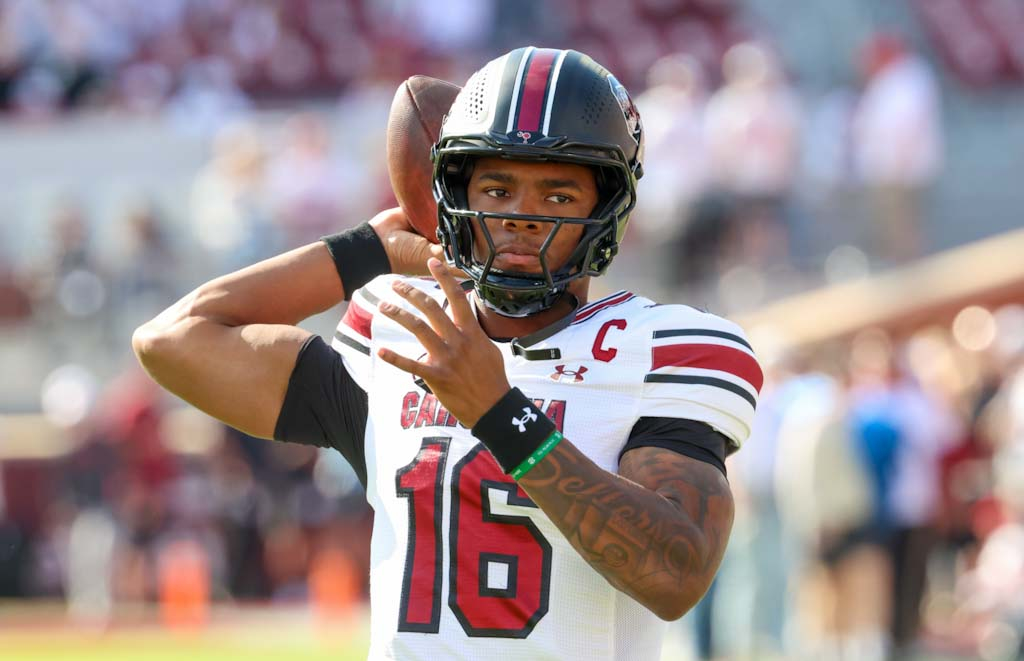LaNorris Sellers, the South Carolina Gamecocks’ talented quarterback, recently made headlines for all the wrong reasons. Just minutes ago, reports emerged that he threatened to leave the team if issues concerning his situation were not addressed. This development is both disappointing and concerning for fans and stakeholders alike, illustrating the complexities that can arise in collegiate athletics, particularly regarding player welfare and team dynamics.
Sellers, a promising athlete with immense potential, has become a key figure in the Gamecocks’ lineup. His unique skill set, characterized by strong passing capabilities and impressive athleticism, has captivated fans and coaches alike. However, his recent public expression of dissatisfaction raises important questions about player treatment and the pressures that young athletes face.
The core of the issue appears to be Sellers’ frustration regarding his role within the team, his playing time, and perhaps the overall support structure surrounding him. It’s not uncommon for student-athletes to feel the weight of expectations, both from themselves and others. In Sellers’ case, being thrust into the spotlight can be particularly overwhelming, especially when it feels like the necessary support isn’t forthcoming.
What’s truly sad about this situation is that it shines a light on the broader issues facing college athletes today. Many young men and women dedicate their lives to their respective sports, sacrificing personal time, education, and sometimes even mental health in the pursuit of excellence. When a talented player like Sellers feels the need to contemplate leaving the team, it signals deeper issues within the program and questions about how youth athletes are being nurtured.

The emotional toll on a player can be severe. Young athletes, especially those in prominent positions, are often under a microscope, facing scrutiny not just from coaches and teammates, but also from fans and the media. An athlete like Sellers can experience peaks of joy and frustrations in a matter of games, creating a rollercoaster of emotions. This pressure can sometimes lead to mental health challenges, as many student-athletes struggle to find balance in their lives.
If Sellers follows through on his threat, the implications could be significant. Not only would it reflect poorly on the coaching staff’s ability to maintain team cohesion, but it could also affect the morale of the entire team. Contributors to the Gamecocks know that they are all part of a larger mission, and seeing a teammate—especially a quarterback who plays a pivotal role—consider leaving the program could lead to distrust, anxiety, and further dissatisfaction among players.
Furthermore, it raises questions about the broader culture within college football. Are players being adequately supported? Are coaches listening to their concerns? Programs need to prioritize mental health and emotional well-being, ensuring that athletes feel heard and valued. If a player like Sellers feels that his concerns are falling on deaf ears, it’s a troubling sign of a disconnect between the athletes and the leadership.
In light of this situation, it’s important for the South Carolina Gamecocks organization to take immediate steps to listen to Sellers and address his concerns. Open communication channels need to be established where players feel safe discussing their issues without fear of repercussions. This goes beyond typical team meetings; it involves creating a culture of transparency and support where players know their voices matter.
Moreover, the athletic department and coaching staff must reflect on how they can create an environment where players thrive. Training in mental health awareness for coaches and support staff can enable them to better understand the challenges their athletes face. Implementing regular check-ins, offering counseling services, and fostering a more inclusive team atmosphere can go a long way in preventing similar situations in the future.
In conclusion, the situation surrounding LaNorris Sellers is a wake-up call for the South Carolina Gamecocks and college athletics as a whole. It highlights the critical need for comprehensive support systems for student-athletes. Watching someone with so much potential consider leaving due to feeling unheard is genuinely sad. Moving forward, it is imperative for the Gamecocks to rally around Sellers, listen to his concerns, and foster an environment that prioritizes both performance and well-being. Only then can they ensure that their athletes feel valued and supported, allowing talents like Sellers to flourish both on and off the field.
